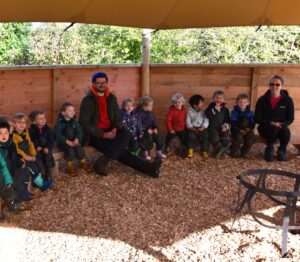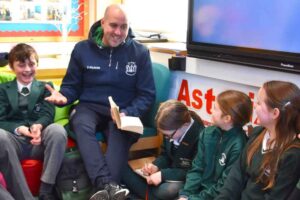“One day you could be a bold adventurer, sailing down the Amazon River, or a monkey swinging from the branches above.”
February 2025
Our Head of Drama, Mrs Footring, tells us why she loves teaching Drama and how she aims to develop her pupils’ confidence and imagination along the way.

I think I have always known I wanted to be a teacher. I still remember writing registers for my teddy bears when I was very young! I have also been lucky enough to have had some wonderful teachers of my own as I grew up who always made learning fun and inspired me to promote a love of learning in children today.
Why did you decide to specialize in your chosen subject area?
From a young age, I remember deciding that I wanted to be a drama teacher because I loved the subject so much. In fact, I rather ambitiously claimed that I would open a drama school one day! Growing up, I was often on stage or putting on shows for family and friends, pretending to be a wide range of characters. I hope that I can encourage the children I teach to develop their confidence and imagination in the same way.
What would the elevator pitch for your subject be?
Drama is a safe space in which to explore stories, characters, and worlds. You can develop your performance and collaboration skills and stretch your imagination. One day you could be a bold adventurer, sailing down the Amazon River, or a monkey swinging from the branches above. The next day, you could be performing a monologue as Tim Peake, returning from the International Space Station; you could even use your body and collaborate with your friends to be the Great Barrier Reef! Drama is limitless and fun!
What do you enjoy about teaching at The Manor?
The amazing children! Each one of them is fantastic and brings a unique creativity to our lessons. They are always polite and kind and work brilliantly together.
What’s your best tip for helping all children to engage with drama, especially if they perhaps lack confidence or have difficulty accessing it as a subject for some reason?
What I love about teaching Drama is seeing the variety of ways children can engage with the same material. Some children dive straight into an imaginary world; others enjoy researching and bringing scientific or historical knowledge into their work. Some children come alive directing and giving feedback to others. There is always a role for each child to engage in, and we always find a way to make sure they can meet the lesson objective whilst approaching it in a way that works for them.
Do you have a favourite play that you like to watch or teach?
I love watching plays that involve interesting use of the stage, such as “The Curious Incident of the Dog in the Night-time.” If I fancy something scary, “The Woman In Black” also does this very well! Of course, I will also always enjoy a wide range of musicals, and I often find myself singing songs from Matilda. When teaching plays, I love seeing perceptions change around Shakespeare, and also I do enjoy our often rather silly Year 6 plays!
If you were not a teacher, what would you want to be and why?
It was a close call between becoming a teacher or a vet when I was younger! I do love animals although I can imagine being a Vet comes with many challenges!
What do “a large white sow, one cow, one pair of goats, three pigs, four flocks of poultry, a beehive and 600 saplings” have to do with The Manor?
And no, this isn’t the start of a bad joke!
December 2024

Recently a new box of such regalia made an appearance. It contained an album of newspaper articles from the 2000s. Intrigued to know what Manor pupils were up to during this decade, I had a flick through and found a few interesting stories to share!
For instance, in 2001, Year 4’s Egyptian Day was reported in a local magazine. Apparently the children enjoyed “an ancient banquet consisting of wonderful food like stuffed vine leaves, fresh figs, olives, humous and honey cakes”. Delicious!
In 2003, pupils took World Book Day to the next level by indulging in a “Book Binge”. According to the Oxford Mail, Manor children spent an entire week enjoying “sea themed” books, with the event culminating in a fancy dress parade.
Another story that made several papers that year, was about a pupil who won a drawing competition run by Le Crunch apples. Their colourful, apple themed illustration won the school £1500 worth of sports equipment!
It was also heartening to read that The Manor’s commitment to helping charitable organisations has a long history; in 2003 pupils raised money to provide a cow, pigs, goats, poultry, a bee hive and saplings for the charity “Send a Cow – Livestock for Life”.
In one, more shocking article, written in 2006, an ex-Manor pupil was interviewed following a serious car accident. Thankfully, she was on the mend but it was fascinating to read that she had founded a successful chemical-free toiletries business after appearing on a TV programme called “Make me a Million”.
And finally, did you know that in 2005 the Early Years department was known as “Manor Munchkins”?
Whilst times have changed, it’s comforting to know that Manor children remain the same at heart; they still show a love of learning, a strong sense of community and charity and a keenness to contribute positively to all areas school life.
“Like it or not, computing is the future!”
November 2024
Our Head of Computing, Mrs Mullaney, explains what led her into teaching and why taking risks can create something beautiful.

Whilst completing my MSc in Information Management Systems, I was explaining to another student the similarities between structured query language (SQL) and a shopping list. She suggested that I would make a good teacher, so here I am!
Why did you decide to specialise in your chosen subject area?
It was the advent of the Internet, and I thought that website design and computing would be a good career path to follow. I had moved a lot as my husband was in the RAF, so I felt ready to settle into something.
What would the elevator pitch for your subject be?
“Like it or not, computing is the future!” Whether it’s education, work, entertainment, health and safety, or transportation, technology plays an important part in our lives, and we need to ensure that our children are competent and confident users. I hope to inspire our children to study a STEAM subject that will feed into the sector and continue the development of ethical and safe technology.
What do you enjoy about teaching at The Manor?
I particularly enjoy and appreciate the trusting relationship which exists between pupils and staff. I laugh every day and I think that this is a very important aspect of education; let’s enjoy learning and being together!
What’s happening in the IT and Tech world that excites you at the moment?
Artificial intelligence (AI) and how it can help us be more creative and efficient interests me greatly. Recently, I attended a conference about AI and, whilst I realise that AI will not replace teachers, it has the potential to allow us more time to adapt to the specific educational needs of our children.
If you weren’t teaching, what would you be doing and why?
I’d like to be a gardener as I love nurturing plants and seeing them mature. I also like to take risks and plant the unexpected to see what happens; I’m all about happy coincidences! This is a phrase I used often when teaching GCSE/A Level Computer Science and Graphic Design; let’s give it a go and we may just create something beautiful!
The Lodge at The Manor: Enjoying the Great Outdoors
October 2024

It is undeniable that outdoor learning has numerous benefits for children including boosting confidence, developing social, emotional and physical skills and increasing knowledge and understanding of the natural world. It is also inclusive and accessible for all, enabling every child to thrive.
Mr Valentine, one of The Manor’s dedicated Forest School Leaders, agrees:
“Outdoor learning offers numerous benefits for children. It provides a unique opportunity to connect with nature, stimulating curiosity and fostering a sense of wonder. Experiencing the natural world first-hand can spark a lifelong passion for the environment. It promotes physical activity, contributing to children’s overall health and well-being. Furthermore, it encourages social interaction and teamwork as children collaborate on activities. By breaking away from the traditional classroom setting, outdoor learning can enhance creativity and problem-solving skills, equipping children with valuable tools for future success.”
Aptly named The Lodge, our outdoor classroom boasts a fire pit for heating cold hands and cooking tasty treats on as well as ample seating and a canvas roof to help protect the children against the elements. Its flexibility will allow for so many exciting experiences and challenges for all ages of children to participate in. The fire pit was stoked for the first “Forest, Fire and Food” after school club session recently, allowing the children to rustle up popcorn to munch on alongside a warming cup of hot chocolate.
What is also truly wonderful about ‘The Lodge’ is that it was funded by the Manor Association of Parents (MAP); it is a great example of how supportive our parent community is and of the value they can add for the children. Thank you MAP!
Raising the (Green) Flag for Environmental Change at The Manor
June 2024

Team Green has gone on to secure an annually awarded Eco-Schools Green Flag, with distinction, for The Manor. This prestigious accolade represents the culmination of a huge amount of hard work that a school must undertake to demonstrate its commitment to creating and maintaining an eco-friendly culture.
Attaining this accreditation is no mean feat! The Eco-Schools programme provides a seven-step framework which guides young people on how to tackle major environmental threats such as plastic pollution and biodiversity loss, in a way that is manageable and meaningful in their school and everyday lives. With the help of Team Green, Mrs Gordon and Mrs Gillies, worked through and evidenced actions to meet the framework which was later reviewed by an assessor from the Eco-Schools programme.
The review cited much praise, recognising the dedication and enthusiasm of Team Green, the good variety of curriculum links across year groups to ensure eco agendas span the school and the importance of young people taking ownership of change implementation.
It is also clear that engaging with such a programme has inspired progress:
“You [The Manor] have educated, inspired, and empowered young people in your school, and they are now they’re carrying this passion into their homes and community, sharing it with friends and family.”
Accreditation not only acknowledges short-term change but encourages long term transformation through the provision of resources and support for staff throughout the year. The benefits of being involved in the Eco-Schools programme are vast with statistics demonstrating that teachers feel involvement increased pupils’ confidence and teamwork skills, as well as their understanding of the environment.
With increasing awareness of environmental challenges, it is great to see The Manor doing its bit and demonstrating forward thinking by engaging in the Eco-Schools programme and attaining the Green Flag award.
Moving from Prep School to Senior School: wise words from Year 7’s, Danny and Eve
May 2024

Whilst there is plenty of support on offer, it can be interesting and comforting to hear the experiences of those who have been through the primary to senior school transition process. As Eve, an ex-Manor pupil who is finishing her first year at Headington Rye Oxford, says “It’s normal to feel nervous, but remember everyone is feeling exactly the same as you.” She continues to say:
“The first day is super fun, you meet your form tutor and your class, then do some activities with your form. You also do an activity to help you figure out where the different classes are, which is really helpful.
For the first week or so, it can feel a bit weird, but you will soon adjust to your new class. A great way to make new friends is to join clubs and after-school activities. You make some really good friends who are interested in the same things as you…
A good tip is not to do much at the weekend for the first couple of weeks, so you can catch up on sleep, and just be able to chill.”
Danny, also an ex-Manor pupil who is currently in Year 7 at Abingdon School, shares similar sentiments.
“When I left the Manor last year, it felt like it was time to move forward. The way Year 6 wrapped up was the best farewell: it gave us the greatest memories, after preparing us for the next stage of our education.
The actual first day at Abingdon School was not technically the first day. We were invited to join a sports camp a week before the official start date, where we all got to meet our future classmates and even break the ice with some of the teachers. It was like dipping our toes in the Abingdon School pool before cannonballing in the deep end. I immediately made new friends and was very happy to know some of them were in my class!”
Whilst Danny makes no pretence that the beginning of senior school can be overwhelming, he is clear that there is help and support to guide Year 7’s.
“As for the actual, actual first day, I have to say I never thought I’d have to run so much! I found myself sprinting down halls, trying to figure out where to go while looking at building and room numbers, all while dodging the gazes of the older years who found our ‘first-year sprints’ absolutely hysterical. The teachers were very friendly, but some were serious and made sure we knew it from Day 1.”
And how can parents prepare their children whilst they adjust to their new secondary school surroundings? Danny suggests the following:
“Here is my advice to you: help your children be more organized by reminding them to check their emails and schedules or planners. Tell them to write important things down and make sure they pack their bags the night before, not in the morning! I’m guilty of doing that, and it’s stressful for everyone!”
Sage words indeed. Feelings of apprehension are a normal response to change, the aforementioned tactics might help make each day a little smoother and ultimately each child and family will find what works for them.
And finally, an encouraging and empowering thought from Danny:
“…to the future Year 7’s, my top tip for you is to give yourself some time to get to grips with everything. Teachers have seen it all, and they don’t expect first years to know everything. You’re going to be alright.”
Nurturing Intrinsic Motivation in Children: The Key to Lifelong Success
Neil Jackson, Head of Years 5 & 6, March 2024

Intrinsic motivation, the internal desire to engage in activities for their own sake, is a powerful force that fuels lifelong learning and fulfilment. As parents, educators, or caregivers, our role in nurturing intrinsic motivation is pivotal. Here’s why:
While extrinsic rewards certainly have their place, they should be used sparingly and thoughtfully. By prioritising intrinsic motivation, we empower children to become self directed learners, creative thinkers and resilient individuals equipped to navigate life’s challenges with confidence and curiosity. So let’s nurture their inner drive, cultivate their passions and watch them soar to new heights of achievement and fulfilment. After all, the greatest rewards are those that come from within.
The Importance of Reading for Pleasure
Victoria Evans, Deputy Head Academic, February 2024
Reading is so important; it provides an escape from the hustle and bustle of everyday life, allowing children to explore new worlds, cultures and ideas.
Beyond the pleasure it brings, the enjoyment of stories and books equips us all with a valuable tool – the ability to gain perspective. It allows us to step into the shoes of characters from diverse backgrounds, fostering empathy and understanding. In an increasingly interconnected world, the capacity to see things through others’ eyes is a skill that will serve your children well as they grow and navigate the complexities of the real world.
It’s crucial that we prepare our children for that real world not just academically, but holistically. At The Manor, we aim to develop resilient, adaptable, and independent thinkers who are not only capable of assessing and directing their own learning but are also equipped to thrive in an ever-changing global landscape.
Independent and collaborative learning styles are both equally important. Independence in learning means empowering our children to ask questions, pursue their passions, and take real ownership of their education. It means teaching them how to research, analyse, and synthesise information effectively. This self-directed approach not only builds confidence but also instils a lifelong love of learning.
Collaboration, on the other hand, is similarly vital. In life, very few problems are solved in isolation. Teamwork and effective communication are skills which will be in high demand as your children enter the workforce of the future. Through group projects, debates, and extracurricular activities, we encourage the children to work together, learn from one another, and appreciate the strength of diverse perspectives.
Reading a range of books helps us all to develop our views and opinions and find the words to express them and is therefore of the utmost importance in both independent and collaborative learning. So our advice is to read with your children, read to your children and enjoy discussing whatever topics you may bump into along the way; it’s a journey worth sharing!